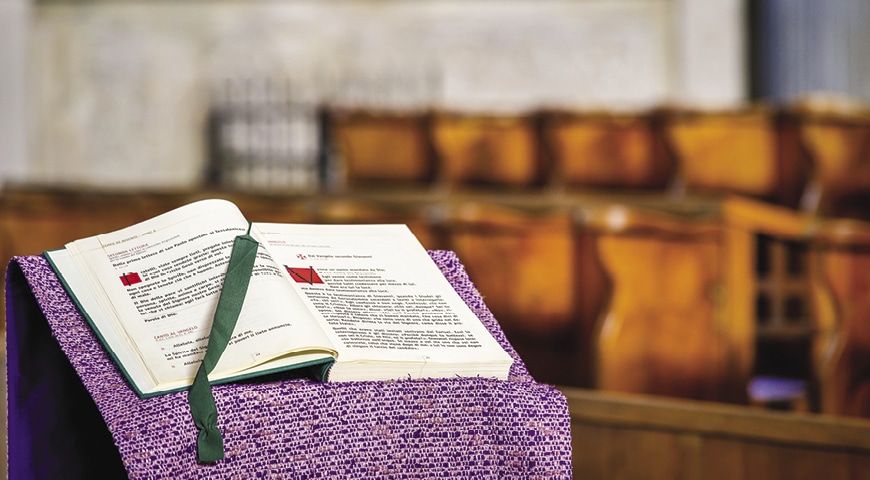I have been a lector for many years. Although I had some training as an actor, I have tried not to be too emotive when I proclaim the readings. Until recently, pastors and people in the parish have given very positive feedback. A couple years ago, however, a new pastor told me that I need to read “flat,” with no emotion. I tried, but he was still displeased. I switched parishes, but those in charge said that how I was reading prevented the congregation from hearing what God intends for them to hear and that my style was distracting the congregation from the readings. What advice can you give?
I’m sorry for the lack of appreciation you have encountered, despite your good intentions. I once presided at a Mass in which the lector read the first reading very dramatically. It was a very good dramatic reading but inappropriate for that occasion. I’m absolutely certain that lector had the best of intentions.
I would amend the advice your first pastor gave you: Don’t read a passage “flat,” but read it “as a believer who has regularly been nourished by God’s word” and who is now sharing that word to help nourish the faith of all those present.
In almost 48 years of priestly ministry, perhaps the best lector I have ever encountered was an elderly woman, now deceased. When she proclaimed the readings from Scripture, I think all present knew for certain that she believed everything that she read.
A dramatic reading of Scripture at Mass runs the risk of demonstrating a lector’s talent at the expense of the faith that this reading is intended to support. A “flat” reading might be appropriate for numbers in the phone book or the stock market report, but a lector has a much greater responsibility.
I suspect that you won’t have to tone down your reading style much to contribute to the faith experience of listeners rather than become a potential rival to what God inspired that biblical author to write.
If it’s any consolation, presiders and homilists face the same challenge as lectors: calling too much attention to their rhetorical skills and not enough attention to the conversion that their presiding and preaching should always foster.
Granted, some presiders and homilists seriously err in the opposite direction: counting too much on God to step in and compensate for their lack of zeal and good preparation.
Please don’t hide your lectoring skills, but rather offer them humbly to build up the body of Christ that is the Church.
Invest Ethically
How can I as an individual know whether I am investing ethically? What products does this company make? What services does it offer? Are they harming the environment or exploiting their workers? Everything is so connected these days that I am uncertain where to begin and what questions to ask.
You are already asking several very good questions. Last November 25, the Pontifical Academy of Social Sciences published “Good Measure, Faith-Based Measures for Catholic Investors: A Starting Point and Call to Action.”
According to this text, investing money is never morally neutral. “Either God’s kingdom is being advanced by the assets we deploy, or it is being neglected and undermined.” The document lists 24 topics, from abortion to water to investing. “No human domain or experience, including investing, is outside of God’s care or beyond the reach of God’s grace,” the text says. It acknowledges that specific decisions must be made on the local level, making reference to similar documents from the bishops of Austria, France, Germany, Italy, and the United States.
Distorting St. Francis of Assisi
In what ways has popular culture distorted both the man and message of St. Francis of Assisi?
Perhaps more so than any other saint I can identify, Francis of Assisi has been treated as a blank screen on which people can project very different versions of “the real Francis.” That trend had already begun by the 13th century.
Some people saw Francis as a forerunner of the 16th-century Protestant Reformation. Others viewed him as the poster child of the 19th-century Romantic movement, with Francis most concerned about nature and animals while being totally outmaneuvered by scheming Church officials.
One 21st-century distortion sees Francis as the opponent of all institutions, religious and secular (also, see page 16 for Pope Francis’ recent comment about misunderstanding St. Francis).
Perhaps this explains why there have been so many biographies of Francis over the centuries. Many, many people have very strong opinions about him and would like to discredit everyone who has a different understanding of Francis. Spurious Francis quotes are floating around, but then similar quotes are attached to Sts. Teresa of Calcutta and Padre Pio. Francis’ life has often been used to promote a particular message. In heaven, we may be surprised to meet the real St. Francis.
Patron of Grocers
Why is St. Michael the Archangel the patron saint of grocers?
As I have already written here a couple times, linking saints with occupations, places, and life situations is the most democratic thing in the Catholic Church. Very few saints are officially designated as patrons. Someone may have a better link of Michael to grocers than I can find. He defends God’s ways in chapter 12 of the Book of Revelation. Thus, it makes sense that he is the patron of policemen and mariners.









1 thought on “A Lector’s Challenge”
The call to holiness extends equally to all baptized Christians. Is the the teaching that consecrated virginity is better than marriage a truth of faith or has it been a commonly held teaching that doesn’t have that kind of weight? Can a person say that both are equally good, just different? And if either is better, is it better if that particular individual had a vocation for one or the other? Again, I understand each person is equally called to holiness. Thank you.